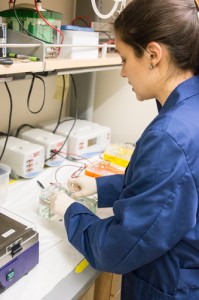
BYU students and staff are taking DNA tests to widen their search in family history work.
Many are using websites such as ancestry.com, familysearch.org and 23andme.com to get information about which region their DNA comes from. These resources also connect testers with other testers they could possibly be related to.
Steve Johnson, an associate professor in microbiology and molecular biology, teaches a genomics class to help students look at their own data and learn to read and interpret it.
He said the websites with DNA tests provide information that can be interpreted for not only genealogy reasons, but for health reasons as well. There are, however, restrictions put on these websites for the testers to only receive specific information regarding where their blood line comes from, he said.
“They look at the DNA and look at a subset of base pairs,” Johnson said. “They look for these differences that make up a small part of your total DNA content. When you’re looking at a strand of DNA there are several pieces. Depending where your ancestors are from, there are certain changes that are common within those groups.”
He also said when taking the DNA test on 23andme.com, he was matched with others the same way familysearch.org and ancestry.com matches testers with those with similar results. Although he was not a member of the church, Johnson said he was able to clarify lineage and family ties with his distant cousin.
He said taking the test confirmed his beliefs that his ancestors came from Europe and that he hopes it will be an advantage for his children to know where they come from.
Steve Baugh, a part-time family history missionary who works in the BYU family history library, said he has taken a couple of DNA tests to not only give him an idea of where to search for names, but to connect with others who have matched to others who share similar relatives.
“All of these people, who are branched out or related to one person can be connected and find collateral names,” Baugh said.
He said it has become helpful because it confirms the family line someone is a part of, especially with the numerous amounts of errors made in family history work.
“My Baugh line are from the Midwest and I didn’t know any of them,” Baugh said. “I didn’t grow up seeing my grandparents too often even though they were all alive. But what this has done for me, when I find census information, I can look and paint a picture of their lives and feel like I know them.”
Steve Baugh is the first member of the church on his father’s side and has been serving as a part-time family history missionary for almost three years.
He explained DNA test results will especially help those who have “hit a brick wall or a dead end” in their family tree and are seeking advanced searches.
“There may be a lot of work done, but there’s a lot of mistakes. There’s still a lot of work to do,” Baugh said.
Brothers Adam and Philip Conte who took the DNA test from ancestry.com said the results not only confirmed the origin of their ancestors, but provided even more diversity than they thought existed in their heritage background. The results showed they are part Armenian, Native American, Italian and Filipino.
They said they were first interested in the test because they have very different physical traits as brothers.
Adam shared that knowing where his ancestors come from is important because it inspires him to work hard as they did and remember where his culture comes from.
“It makes me feel like I can do the same things, have the same kind of respect they did. It’s like a direction in life and forms the person I am today,” Adam said.
Philip said remembering his culture, heritage and traditions is important so that he can appreciate what they contributed to his family.
Similar to Baugh, Philip said on ancestory.com he was able to connect with others who matched up to his results. Adam and Philip said knowing where they come from inspires them to practice culture practices and to work on genealogy often.
“Once you know you’re of a certain blood you grow more fond of it and you feel a responsibility to learn about it,” Philip said.




